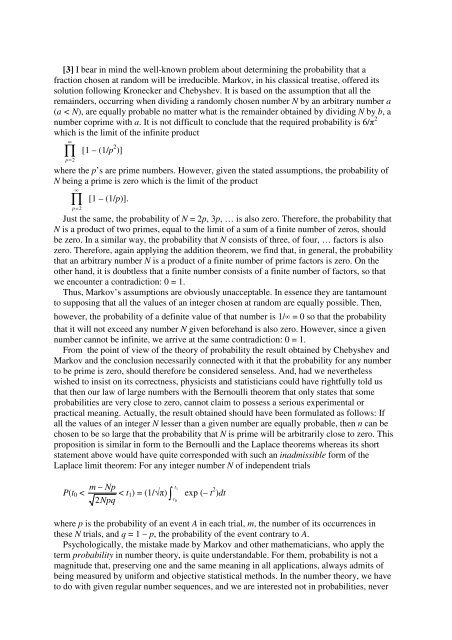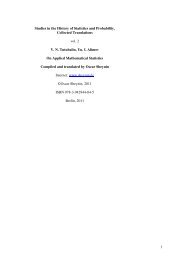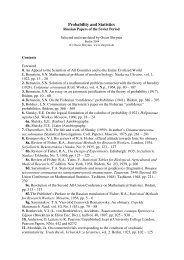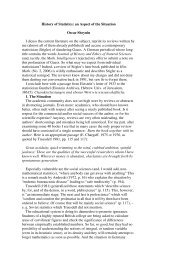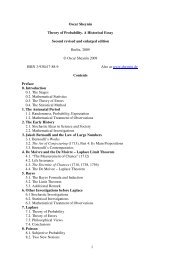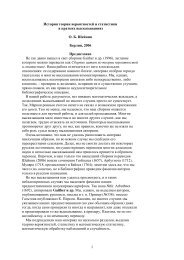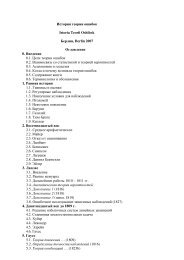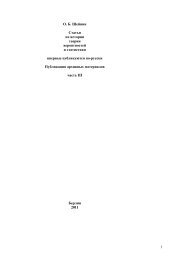[3] I bear in mind the well-known problem about determining the probability that afraction chosen at r<strong>and</strong>om will be irreducible. Markov, in his classical treatise, offered itssolution following Kronecker <strong>and</strong> Chebyshev. It is based on the assumption that all theremainders, occurring when dividing a r<strong>and</strong>omly chosen number N by an arbitrary number a(a < N), are equally probable no matter what is the remainder obtained by dividing N by b, anumber coprime with a. It is not difficult to conclude that the required probability is 6/ 2which is the limit of the infinite product∏ ∞=2 p[1 – (1/p 2 )]where the p’s are prime numbers. However, given the stated assumptions, the probability ofN being a prime is zero which is the limit of the product∏ ∞=2 p[1 – (1/p)].Just the same, the probability of N = 2p, 3p, … is also zero. Therefore, the probability thatN is a product of two primes, equal to the limit of a sum of a finite number of zeros, shouldbe zero. In a similar way, the probability that N consists of three, of four, … factors is alsozero. Therefore, again applying the addition theorem, we find that, in general, the probabilitythat an arbitrary number N is a product of a finite number of prime factors is zero. On theother h<strong>and</strong>, it is doubtless that a finite number consists of a finite number of factors, so thatwe encounter a contradiction: 0 = 1.Thus, Markov’s assumptions are obviously unacceptable. In essence they are tantamountto supposing that all the values of an integer chosen at r<strong>and</strong>om are equally possible. Then,however, the probability of a definite value of that number is 1/ = 0 so that the probabilitythat it will not exceed any number N given beforeh<strong>and</strong> is also zero. However, since a givennumber cannot be infinite, we arrive at the same contradiction: 0 = 1.From the point of view of the theory of probability the result obtained by Chebyshev <strong>and</strong>Markov <strong>and</strong> the conclusion necessarily connected with it that the probability for any numberto be prime is zero, should therefore be considered senseless. And, had we neverthelesswished to insist on its correctness, physicists <strong>and</strong> statisticians could have rightfully told usthat then our law of large numbers with the Bernoulli theorem that only states that someprobabilities are very close to zero, cannot claim to possess a serious experimental orpractical meaning. Actually, the result obtained should have been formulated as follows: Ifall the values of an integer N lesser than a given number are equally probable, then n can bechosen to be so large that the probability that N is prime will be arbitrarily close to zero. Thisproposition is similar in form to the Bernoulli <strong>and</strong> the Laplace theorems whereas its shortstatement above would have quite corresponded with such an inadmissible form of theLaplace limit theorem: For any integer number N of independent trialsP(t 0
to be determined experimentally, but rather in the limiting, asymptotic frequencies ofnumbers of some class, regularly distributed in these sequences. These limiting frequenciespresent some similarities with mathematical probabilities heuristically very valuable for thetheory, but the confusion of these two concepts is an inadmissible misunderst<strong>and</strong>ing.[4] Analogous paradoxes occur also in some geometrical problems of probability theory.An investigation of this subject from the viewpoint of the theory’s unity <strong>and</strong> possibility of anempirical checking of its deductions leads to the conclusion that the theory of probability isfar from being able to consider all abstract sets. However, under appropriate restrictions <strong>and</strong>taking some precautions, on which I cannot dwell here, an arithmetization of infinite sets, i.e.,the determination of the probabilities of all their sensible propositions, is possible withoutcontradiction. I shall only remark that the main source of the paradoxes was that thearithmetization of infinite sets had been carried out more or less intuitively rather than bydistinctly formulating which of the two principles, continuity or discontinuity, was chosen asits foundation. The former corresponds to the assumption that it is senseless to state that twomagnitudes are equal one to another because in an experiment equalities can only be realizedwith some error <strong>and</strong> not absolutely precisely. On the contrary, the latter is applicable tomagnitudes whose precise equality admits of actual checking; their totality is alwayscalculable <strong>and</strong> they cannot be equally probable (if the totality is infinite). In each particularcase, only experiment can <strong>and</strong> should decide which of the two hypotheses is true.Thus, the theory of radiation of a blackbody, issuing from the principle of continuity,arrives at the Rayleigh law of distribution of radiant energy. However, since this law did notconform to experiment, Planck was compelled to assume the principle of discontinuity, or ofstep-wise changes of energy, <strong>and</strong> to create his celebrated quantum theory that was entirelycorroborated not only by all the phenomena of radiation, but also by the properties of heatcapacity of bodies at all possible temperatures. Classical mechanics, whose laws werederived by observing the movement of bodies of finite dimensions, dem<strong>and</strong>s essentialchanges in order to interpret phenomena connected with radiation. A deeper reason for thisconsists in that this discipline leads to a uniform distribution of energy among an infinitenumber of degrees of freedom, i.e., in essence, to the contradictory assumption of an infiniteset of equally possible incompatible cases, see above.Quantum mechanics encounters serious difficulties as well; these, however, are not in theplane of probability theory but in the sphere of our mechanical <strong>and</strong> geometric ideas which wedesire to apply to such elements as the electron, never observed all by themselves. In anycase, from the st<strong>and</strong>point to be developed below, it is not necessary to seek for a definitemechanical-geometric model of the atom; we may be satisfied by a physical theoryconstructed on a pattern of a harmless play between all the electrons of a given body with itsrules being dictated by observed macroscopic phenomena.[5] Returning to the principles of probability theory, it may be thought, as it seems to me,that the main formal logical difficulties of its construction have by now been surmounted 3 . Itis not enough, however, to acknowledge that, when keeping to the well-known rules ofcalculation accepted by the theory, we may without logical contradictions attribute definiteprobabilities to various facts. Is there any physical sense in saying that two different factspossess equal probabilities? Do not we sin against the law of causality when stating that intwo trials, when throwing two identical dice, the probability of a six is the same in both caseswhereas the actual outcomes were a six <strong>and</strong> a five?Much attention, both previously <strong>and</strong> recently, was given to this question important boththeoretically <strong>and</strong> practically. If we are now closer to some like-mindedness with respect to itssolution than we were several decades ago, we owe it not to deeper philosophical reasoningas compared with the deliberations expressed by Laplace or Cournot, but to the experimental
- Page 6 and 7: successes of physical statistics. B
- Page 8 and 9: classes of independent facts whose
- Page 10 and 11: distribution is a corollary of the
- Page 12 and 13: examine in the first place the curv
- Page 14 and 15: 12. According to Bortkiewicz’ ter
- Page 16 and 17: generality, the similarities taking
- Page 18 and 19: one on another, as well as the corr
- Page 20 and 21: is inapplicable because the right s
- Page 22 and 23: Instead, Slutsky introduced new not
- Page 24 and 25: abandoned in August 1936, but it is
- Page 26 and 27: last decades, mathematicians more o
- Page 28 and 29: charged with making the leading ple
- Page 30 and 31: motion and a number of others) are
- Page 32 and 33: phenomena. It is self-evident that
- Page 34 and 35: Such new demands were formulated in
- Page 36 and 37: The addition of independent random
- Page 38 and 39: automatic lathes, etc. Here, the ma
- Page 40 and 41: 11. Kolmogorov, A.N. Grundbegriffe
- Page 42 and 43: period 1 and remained, until the ap
- Page 44 and 45: of the analytical tool rather than
- Page 46 and 47: with probability approaching unity,
- Page 48 and 49: logic. The ensuing vagueness in his
- Page 50 and 51: 2. Gnedenko, B.V. (1949), On Lobach
- Page 52 and 53:
will be sufficient, although not ne
- Page 54 and 55:
nlimk = 1P(| k (n) - m k (n) | > H
- Page 56 and 57:
favorite classical issue as the gam
- Page 58 and 59:
and some quite definite (not depend
- Page 60 and 61:
influenced by a construction that a
- Page 62 and 63:
P ij (1) = p ij (1) , P ij (t) =kP
- Page 64 and 65:
4.2d. Bebutov [1; 2] as well as Kry
- Page 66 and 67:
are yet no limit theorems correspon
- Page 68 and 69:
described, from the viewpoint that
- Page 70 and 71:
conditional variance and determined
- Page 72 and 73:
Romanovsky [45] and Kolmogorov [46]
- Page 74 and 75:
Let S be the general population wit
- Page 76 and 77:
Part 1. Russian/Soviet AuthorsAmbar
- Page 78 and 79:
2. On necessary and sufficient cond
- Page 80 and 81:
Gnedenko, B.V., Groshev, A.V. 1. On
- Page 82 and 83:
52. ( (Mathematical Principl
- Page 84 and 85:
Kozuliaev, P.A. 1. Sur la répartit
- Page 86 and 87:
Obukhov, A.M. 1. Normal correlation
- Page 88 and 89:
30. Généralisations d’un théor
- Page 90 and 91:
22. Alcune applicazioni dei coeffic
- Page 92 and 93:
10. A.N. Kolmogorov. The Theory of
- Page 94 and 95:
Kuznetsov, Stratonovich & Tikhonov
- Page 96 and 97:
In the homogeneous case H s t = H t
- Page 98 and 99:
to such a generalization. He only s
- Page 100 and 101:
In the particular case of a charact
- Page 102 and 103:
as it is usual for the modern theor
- Page 104 and 105:
1. {The second reference to Pugache
- Page 106 and 107:
Smirnov, Romanovsky and others made
- Page 108 and 109:
determined the precise asymptotic c
- Page 110 and 111:
for finite values of N, M and R 2 .
- Page 112 and 113:
Mikhalevich’s findings by far exc
- Page 114 and 115:
Uch. Zap. = Uchenye ZapiskiUkr = Uk
- Page 116 and 117:
Khinchin, A.Ya. 43. Math. Ann. 101,
- Page 118 and 119:
7. DAN 115, 1957, 49 - 52.Pinsker,
- Page 120 and 121:
Anderson, T.W., Darling, D.A. (1952
- Page 122 and 123:
Statistical problems in radio engin
- Page 124 and 125:
observations for its power with reg
- Page 126 and 127:
securing against mistakes (A.N. Kry
- Page 128 and 129:
of the others, then its distributio
- Page 130 and 131:
In Kiev, in the 1930s, N.M. Krylov


